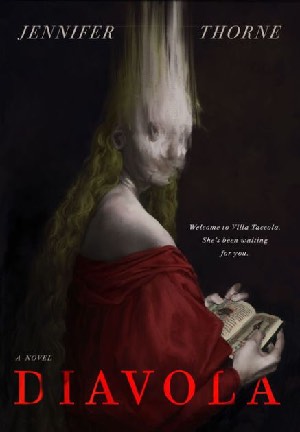
Diavola
“French Provincial” and “Southern Gothic” are well known geographically inspired terms. “Toxic Tuscan” will no doubt be added to the list by those who read Diavola. Jennifer Thorne’s gripping horror novel is predominantly set in Tuscany but the toxicity in the relationships between the protagonist, her parents and two siblings has no borders.
Central character Anna Pace is in her mid-thirties. An underachiever who suppresses her obvious talent as an artist, Anna opts instead for the steady but uninspiring security of creating visuals for a New York city ad agency. She is acerbically observant regarding ambience and demeanor, and therefore has no illusions about the prospect of sharing a rental villa with her judgmental family. To combat the inevitable barrage of criticism that she knows will occur when reunited with her cloying kin, she secretly arrives in Italy to explore and sketch before they descend en masse. It will be one more thing that her family will view as a form of betrayal once discovered. Even her more sympathetic gay twin brother aligns himself with their parents and controlling married sister in finding fault for this and other perceived transgressions.

Compounding the nightmare scenario is the unnerving sensation that the villa is haunted. The haunting entity has laid out what seems to be a perversely creepy sort of welcome mat for Anna, zoning in on Anna’s emotional isolation. Her sharped-tongued caustic wit and penchant for sardonic observation set Anna apart, as evidenced by her viewpoint while touring the Uffizi Museum: “Anna peered upward as they walked, picking out the grotesques painted on the ceiling panels, friendly little beasties, pagan traditions sneaking back in wherever they could. Devils were everywhere in Florence. You just had to look.”
There are indeed shadows under the Tuscan sun. The villa ghost referred to as “La Dama” grows literally attached to Anna, even venturing back with her to New York City. Anna’s lifestyle is subsequently put into further turmoil; neighbors in her building can’t tolerate the loud noises emanating from her apartment. And her job is also adversely affected. Anna takes this in snarky stride, adjusting to the hurdles with a bordering-on psychotic aplomb. But it becomes clear that this cannot go on and that a trip back to Italy is required to vanquish the hostile spectre. The villa vibes are far from welcoming: “Anna felt malice wrap around her, sharp as an itchy sweater now, that awful grating feeling, chalk on her fingers, eyebrow hairs being tweezed too quickly, the music they play when you’re on hold for customer support.”
Ghostly menace combined with poisonous familial dynamics makes for potent horror. Most of us can relate to painfully awkward family situations and understand the inherent toxicity, and that makes Anna’s unfettered sarcasm relatable and liberating. Author Jennifer Thorne nicely stirs the supernatural into the narrative cauldron, peppering the concoction with a devious glee that is infectious. Delightfully diabolical, Diavola slyly taps into the fear of the unknown in tandem with the all too real dread of unsavory familial interactions.

